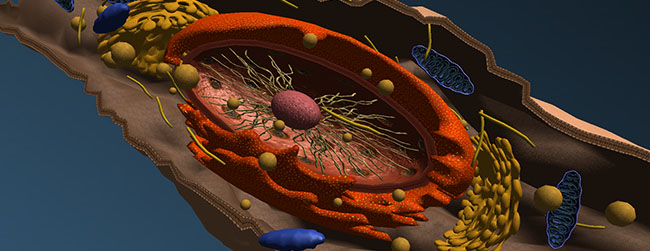- Have any questions? Contact us!
- info@dr-rath-foundation.org

Hospital Food And Nutrition Classes In Medical Schools: Can You Work Out What The Connection Is?
January 12, 2017
They Still Dance On The Graves Of The Auschwitz Survivors
January 26, 2017Promoting Old Drugs For Dangerous New Uses: Study Claims Calcium Channel Blockers Stop Spread Of Cancer

A recent study claims that a class of prescription drugs widely used for the management of high blood pressure, irregular heartbeat, and other heart conditions can stop the spread of cancer. Published in the Nature Communications journal by researchers at the University of Turku, Finland, the study asserts that calcium channel blockers can supposedly block breast and pancreatic cancer invasion. Given however that these drugs have been scientifically shown to obstruct the uptake of vitamin C – a key anti-cancer nutrient – into cells, not only is this a dangerous idea, the sole beneficiary from their use in cancer patients would be the trillion-dollar-a-year pharmaceutical business with disease.
Amounting to over $11 billion globally in 2016, sales of calcium channel blockers are expected to reach $15 billion by 2022. Taken by tens of millions of patients worldwide, they block specific channels located in the walls of the smooth muscle cells that line the blood vessels, the cardiac muscle cells, and other tissues, and prevent calcium from entering. This results in relaxation of the cells and other pharmacological effects. As with all pharmaceutical medications however, there can also be some serious side effects.
Calcium channel blockers inhibit collagen formation and weaken arterial walls
A study conducted by researchers at the Dr. Rath Research Institute has shown that calcium channel blockers also impede the entry of vitamin C into cells. Published in the American Journal of Cardiovascular Disease in 2016, this important finding explains the reason behind the increased risk of heart disease, breast cancer, and gum problems that have been reported in clinical studies testing these drugs.
Vitamin C is an essential nutrient for the production of collagen, the key stability molecule for arterial walls and the connective tissue in general. A lack of vitamin C therefore inhibits collagen formation and weakens the walls of the arteries. Crucially, the Dr. Rath Research Institute’s study explains how to overcome this deficiency through proper supplementation with vitamin C, thereby providing potentially life-saving scientific information for millions of doctors and patients all over the world.

With the publication of this groundbreaking finding, it henceforth became scientifically and ethically impossible for any doctor to prescribe channel blockers without also recommending a regular supplemental daily intake of vitamin C.
Use of calcium channel blockers increases risk of breast cancer
A study published in the Journal of the American Medical Association (JAMA) Internal Medicine in 2013 found that use of calcium channel blockers for 10 or more years in women aged between 55 and 74 was associated with an increased risk of breast cancer. Carried out by researchers in the United States in the form of a large population-based case-control study, the analysis clearly showed that women taking the drugs had a risk of breast cancer around two and a half times higher than those who never used them.

Given that calcium blockers deplete levels of the key anti-cancer nutrient vitamin C in cells, and that this nutrient is essential for production and maintenance of collagen, the finding of this study was hardly surprising. In fact, an optimal production of collagen molecules is not only vital for the stability of blood vessel walls as described above, it also forms the basis for an effective defense against the spread of cancer. Research conducted at the Dr. Rath Research Institute has long proven that a pathomechanism common to all cancers, namely, the degradation of their surrounding connective tissue by collagen-dissolving enzymes, can be inhibited through providing optimum amounts of vitamin C. In short, the presence or absence of vitamin C plays a key role in determining whether sufficient collagen is produced – and therefore whether cancer can spread. Combining vitamin C with other collagen-supporting micronutrients, such as the amino acids lysine and proline, increases its anti-cancer effectiveness still further.
Promoting new uses for dangerous drugs is a key strategy of the pharma industry
The claim that calcium channel blocking drugs can supposedly stop the spread of cancer is consistent with one of the key strategies of the business with disease. Towards expanding their markets pharmaceutical companies are continuously looking for new applications for existing drugs, particularly when their patents have expired. Promoting the painkiller aspirin under the illusion that it will prevent heart attacks is one of the classic examples of this.
Worse still, the fact that calcium channel drugs cause cancer will not be seen by pharma companies as a barrier to promoting them for preventing its spread. To the contrary, with cancer drugs already the pharma industry’s top-ranking therapy area, producing annual global sales of almost $79 billion, any strategy that can increase profits is seen as good for business.
In a graphic illustration of the human results of such immoral tactics, a study published in the Journal of the American Medical Association (JAMA) in July 2000 found that orthodox doctors, hospitals, and their treatments are now the third leading cause of death in the United States, exceeded only by deaths from heart disease and cancer. What this therefore tells us is that our current global healthcare model is broken beyond repair, and that the pharma industry remains the biggest obstacle to fixing it.



